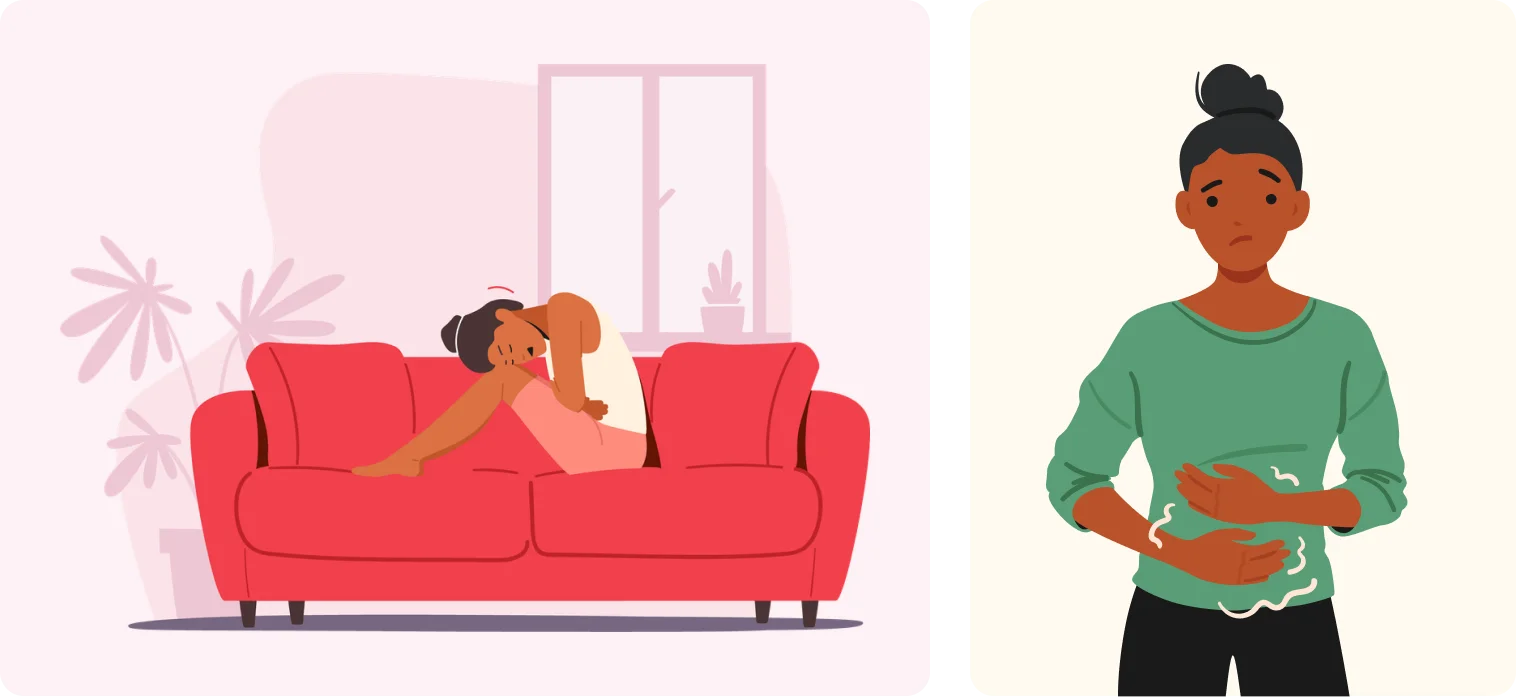Overview
Irritable Bowel Syndrome (IBS) is a common gastrointestinal disorder that affects your gastrointestinal tract—stomach and large intestine (colon)—causing various symptoms including cramps, bloating, pain, diarrhoea and constipation. It is a chronic condition that people need to manage over the long term.
IBS is usually a lifelong problem with no cure, but there are many lifestyle changes and medicines that can help control symptoms.

Causes
We still don’t know the exact cause of IBS, but several factors likely contribute to its development:
- Abnormal gut motility when the muscles in your intestines contract too much or too little
- Increased sensitivity to pain and discomfort in the intestines
- Communications between the brain and the gut can get cut off, something called ‘gut-brain axis dysfunction’
- Stress and anxiety
- FODMAPs can trigger bouts of IBS. They are certain types of carbohydrates that the small intestine has trouble absorbing, such as dairy, gluten, spicy foods, foods high in fat, and caffeine.
Symptoms
Fortunately, only a small number of people with IBS have severe symptoms but most will experience some degree or a mix of the following:
- Recurrent abdominal pain and discomfort, usually worse after eating
- Bloating, stomach feeling too full or swollen, gassy
- Diarrhoea (IBS-D), watery poo
- Constipation (IBS-C), straining when you go poo
- Mucus in stools
- Feeling like you can’t completely get all if your stool out of you when you want to
Treatments
Treatment for IBS typically involves a combination of dietary and lifestyle changes, medications, and stress management techniques. It’s important to work closely with healthcare providers to develop a personalized treatment plan tailored to your specific symptoms and needs. Keep in mind, it may take time and experimentation to find the most effective combination of treatments.
Dietary Modifications:
- Increasing dietary fiber, the soluble fiber found in oats, barley, fruits, and vegetables) can help regulate bowel movements.
- Reduce intake of fermentable carbohydrates known as FODMAPs (fermentable oligosaccharides, disaccharides, monosaccharides, and polyols).
- Avoid certain foods that can trigger IBS symptoms such as dairy products, fatty foods, caffeine, alcohol, and gas-producing foods like beans and cabbage.
- Avoid products containing a sweetener called sorbitol
- Eat smaller, more frequent meals and avoiding large meals.
- Drinking plenty of water is important for maintaining bowel regularity.
Stress Management:
- Cognitive-behavioral therapy (CBT) or gut-directed hypnotherapy can help manage stress and anxiety related to IBS.
- Deep breathing, meditation, or yoga may help reduce stress and alleviate symptoms.
- Regular exercise can help regulate bowel function and reduce stress, both of which may improve IBS symptoms.
Alternative Therapies:
- Acupuncture works to relieve symptoms in some individuals.
- Herbal Remedies such as peppermint oil capsules and herbal teas such as chamomile or ginger may provide symptom relief for some individuals.
Medications
From antispasmodics and laxatives to antidepressants and probiotics, medications can play a crucial role in managing the symptoms of Irritable Bowel Syndrome (IBS). These treatments aim to target specific symptoms such as pain, diarrhoea, constipation, or overall gut motility, often in conjunction with dietary modifications, lifestyle adjustments, and stress management techniques mentioned earlier.
- Antispasmodics: Medications that relax the muscles in the gut such as Hyoscine butylbromide and mebeverine (available on prescription).
- Antidiarrheals: Loperamide (Imodium) can help control diarrhea.
- Laxatives: For those with constipation-predominant IBS, osmotic laxatives such Lactulose work by drawing water into the colon and softening the stool.
- Probiotics: Some studies suggest that certain probiotics can improve IBS symptoms by promoting healthy gut bacteria balance.
- Tricyclic Antidepressants (TCAs): Low doses of TCAs like amitriptyline or nortriptyline can be prescribed to help relieve pain and improve bowel function.
- Selective Serotonin Reuptake Inhibitors (SSRIs): SSRIs such as citalopram, fluoxetine or sertraline may be prescribed for individuals with IBS who also have symptoms of depression or anxiety.
FAQ
Can stress worsen IBS?
Yes, stress and anxiety can make IBS symptoms worse. Stress can lead to changes in gut motility, sensitivity, and function, triggering or worsening IBS symptoms. Stress management techniques such as breathing exercises can help.
Can IBS be cured?
Currently, there is no known cure for IBS. However, with proper management and lifestyle modifications, many individuals can effectively control their symptoms and improve their quality of life.
How do you test for IBS?
There is no specific diagnostic test for IBS. Diagnosis is typically based on a thorough medical history, physical examination, and the presence of characteristic symptoms such as abdominal pain, bloating, and changes in bowel habits. In some cases, healthcare providers may order tests such as blood tests, stool tests, colonoscopy, or imaging studies to rule out other gastrointestinal conditions.



















